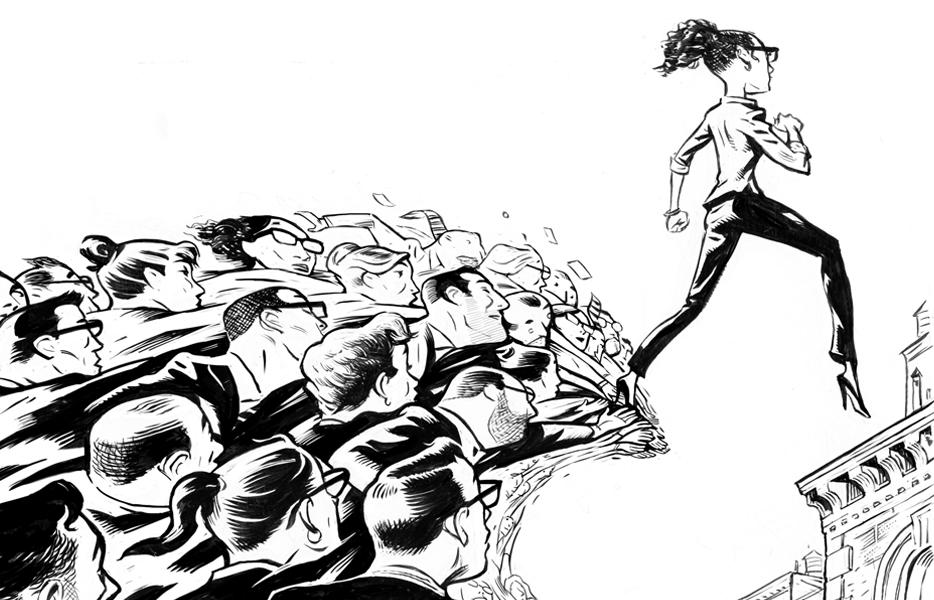Basicexplanation
Managementthinkingisthegeneraltermfortheopinions,thoughtsandinsightsformedbypeople'sthinkingaboutmanagementactivitiesinsocialpractice.
Itispeople'sconsciousandsystematicreflectionofvarioussocialrelationsandcontradictoryactivitiesinmanagementpractice.Managementthinkingisgraduallyformedanddevelopedonthebasisofmanagementpractice.Ithasexperiencedthedevelopmentprocessfromthebuddingofideas,theformationofideastothecontinuoussystemanddeepening.
Background
Inthelong-termhistoricalprocessofancientsociety,peoplewereinanunconsciousstateofthinkingaboutmanagementpractices,andtheywereconcernedaboutthespecificproblems,specificlinksandmethodsofmanagement,etc.Inthisregard,manyinsightshavebeenputforward,andmanysuccessfulmanagementexperiencesandmethodshavebeenrecorded,thusformingarichheritageofancientmanagementthoughts.However,thesemanagementideasarescatteredandfragmented,lackingtheoreticalanalysisandgeneralization,letaloneanideologicalsystem.
Untilthelate19thcentury,drivenbythehighdevelopmentofsocialproductivityandtherapidprogressofscienceandtechnology,managementissuesreceivedattentionandattention.Theobservation,researchandsummaryofmanagementpracticescontinuedtodevelop,makingpeoplemoreTheunderstandingcontinuestobesystematicanddeep,andmanagementthinkinggraduallyformsanindependentideologicalsystem,whichmakesmanagementadiscipline.
Theemergenceofmanagementhasbroughtthedevelopmentofmanagementthoughtintoanewrealm.Thehistoryofmanagementthoughttakestheevolutionprocessofmanagementthoughtindifferentsocialstagesasitsownresearchobjectandexploresitsdevelopmentlaw.Fromadisciplinarypointofview,thehistoryofmanagementthoughtisasciencethatstudiesandrevealsthehistoricalprocessandlawsoftheemergence,developmentandevolutionofhumanmanagementthought.
Theresearchobjectsofthehistoryofmanagementthoughtincludenotonlymanagementpractice,butalsomanagementthought,managementtheory,andthedialecticalrelationshipbetweenmanagementpracticeandmanagementthoughtandmanagementtheory,thetransformationofsocialproductionmethodsandtheevolutionofmanagementthoughtMutualrelations,etc.Thehistoryofmanagementthoughtisnotonlymeaningfultomanagersinvariousindustries,butalsoaneffectivewayforustoabsorbtheachievementsofforeignmanagementscience.Learningthehistoryofmanagementthoughtismorehelpfultoimproveouroverallquality.
Theevolutionofthought
Ancientmanagementthought
1.AncientChinesemanagementthought
2.Foreignmanagementthought
3.Ancientmanagementthought
Characteristics:richincontent,all-inclusive,mainlyintuitionisticexpositionsandexplanationsofexperience,andtheexpositionsarescatteredandfragmented.
ClassicalManagementTheory
1.ScientificManagementTheoryFrederickWinslowTaylor(1856-1915)"FatherofScientificManagement"
(1)Threemajormanagementexperiments:ironblockhandlingexperiment,shovelexperiment;metalcuttingexperiment.
(2)Timeactionresearchandgradedpieceratewagesystem
Specificstepsoftimeactionresearch:
a.FindsomePersonnel,thesepersonnelshouldbeparticularlygoodatdoinganalyticalwork.
b.Carefullystudythebasicoperationsandactionsofeachoftheabove-mentionedindividuals,includingthetoolsusedbyeachindividual.
c.Useastopwatchtostudythetimerequiredtodoeachbasicmovement,andthenchoosethefastestworkingmethodforeachpartofthemovement.
d.Eliminateallincorrect,slowandinvalidactions.
e.Replacetheoldmethodsusuallyusedinthepastwithnewmethodscomposedofthefastestandbestnewactions.
Specifyworktaskquotasonthebasisoftime-actionresearch.Thequotaofworktasksisnotdeterminedbasedontheaverageworkingtimeofworkers,butbasedonthetimerequiredbyefficientfirst-rateworkers.Sinceitisatask,theworkersshouldbepaidhighwages.Inordertomobilizetheenthusiasmoftheworkers,Taylorinventedthedifferentialpieceratesystem.
Differentialpieceratewagesystem:Ifaworker’sproductionvolumeislowerthanthetaskstandard,thewagewillbecalculatedatalowerwagerate,andifitishigherthanthetaskstandard,itwillbecalculatedatahigherwageratesalary.Thismeansthatworkersatthesamelevelinthesamepositionwillreceivedifferentwages.
(3)Thebasicprinciplesofscientificmanagementandthetheoryoforganization
Taylorbelievesthatmanagementandworkersshouldbejointlyresponsiblefortheresultsofmanagement.
Basicprinciplesofscientificmanagement:
a.Developanewsciencethatspecializesinthestudyofeverycomponentofworkers’workandreplacespreviousexperiencemanagementmethodswiththis.
b.Scientificallyselect,trainandtrainworkerstoreplacetheoldsystemwhereworkerstrainthemselvesandchoosejobs.
c.Managersmustcooperatesincerelywithworkerstoensurethatworkersworkhardinnewways.
d.Carryoutaclearandappropriatedivisionoflaborbetweenmanagersandworkers.
Organizationprincipleofscientificmanagement:
a.Functionalprinciple:Inamanagementorganizationsystem,departmentsaresetupaccordingtodifferentfunctions,andthefunctionaldepartmentsaredirectlyresponsibleforthesuperiormanagers.TheyTheyalsohavetheirowntermsofreference.
b.Exceptionprinciple:Topmanagementshouldavoiddealingwithsmallproblemsinthework,andonly"exception"situationsandproblemsshouldbehandledbytopmanagement."Exceptional"situationsandproblemsrefertonewsituationsandproblemsthataredifficultforvariousfunctionaldepartmentstoadjustthemselvesorthatarenotincludedintheoriginalauthority.
(4)EvaluationofTaylor'sscientificmanagement:
Contributions:First,managementmovestowardscience;second,thespiritualrevolutionbetweenlaborandmanagement.Theformerisanecessaryconditionforeffectivemanagement;thelatterisanecessarypsychologyforeffectivemanagement.
Insufficiency:Scientificmanagementhastoomuchemphasisontechnology,emphasizestheefficiencyofindividualoperations,biasesagainstpeople,andignoreshistoricallimitationssuchastheoverallfunctionoftheenterprise.Therefore,itshouldbe"knowledgeable"whenusingit.
2.Generalmanagementtheory
(1)Fayol:"FatherofModernManagementTheory".
(2)Themainpointsofgeneralmanagementtheory:
a.Thedifferencebetweenoperationandmanagement.
b.Fiveelementsofmanagement.
c.Fourteenprinciplesofmanagement:divisionoflabor,powerandresponsibility,discipline,unifiedcommand,personalinterestsubordinatetotheoverallinterest,personnelcompensation,concentrationanddecentralization,hierarchicalchain,order,fairness,personnelStability,pioneeringspiritandteamspirit.
d.Advocatemanagementeducation:managementabilitycanbeobtainedthrougheducation,"lackofmanagementeducation"isdueto"nomanagementtheory",nomanagerstrytomakethoseacceptedrulesandexperiencesuniversalManagementtheory.Throughmanagementeducation,themanagementabilityofthemanagementcanbequicklyimproved,andtheurgentlyneededmanagementtalentscanalsobequicklycreated.Allmanagersofanenterprisereceivenecessarymanagementtraining,whichisalsoanimportantbenchmarkforthehealthydevelopmentoftheenterprise.
(3)Theoryofidealadministrativeorganizationsystem
(1)Weber:"FatherofOrganizationManagement".
(2)Weber'stheoryofpower.
(3)Themainpointsoftheidealadministrativeorganizationsystemtheory:acleardivisionoflabor,atop-downpowerhierarchysystem,appointmentofpersonnel,professionalmanagers,compliancewithrulesanddisciplines.,Therelationshipbetweenpeopleintheorganization.
BehavioralScienceManagementTheory
1.HawthorneExperimentandInterpersonalRelationshipTheory

(1)HawthorneExperiment
Thefirststage:Factorylightingexperiment(1924-1927).
Thesecondstage:Relayassemblyroomexperiment(August1927-April1928).
Thethirdstage:interviewplan,wiringboardwiringstudioexperiment.
(2)Thebasicpointsofthetheoryofinterpersonalrelations
Peopleare"socialpeople".Tomobilizeworkers'enthusiasmforproduction,wemustalsoworkhardfromsocialandpsychologicalaspects.
Workefficiencymainlydependsontheenthusiasmofemployees.
Therearealsoinformalgroupsamongemployees.
Materialstimulationisnottheonlymeansofmotivation.
Managersshouldattachimportancetointerpersonalrelationships.
Economicman
Iambornlazyandalwayswanttodolesswork;mostpeoplehavenoambitions,donotliketoberesponsible,andwouldratherbedirectedbyothers;
Self-centerednessisthenatureofpeople,andtheydon’tcareaboutthegoalsoftheorganization;peoplelackself-controlandareeasilyinfluencedbyothers
money+whip
socialpeople
Thinkingthatthemotivationofpeople’sbehaviorisnotjustthepursuitofmoney,butallthesocialneedsofpeople;peopleusesocialrelationshipsatworktofindfunandmeaning;thesocialinfluenceofworkersoncolleaguesisgreaterthantheeconomicsgivenbytheorganizationPaymoreattention;theworkefficiencyofworkerswillchangeastheirsuperiorscanmeettheirsocialneedsLater,theypursuemoreadvancedneeds.Self-realizationisthehighestlevelofhumanneeds;peoplebecomematureduetoworkandtendtobeindependentandautonomous;peoplehavetheabilitytobespontaneousandself-control;personalgoalsandorganizationalgoalsThereisnofundamentalconflictbetweengoals.Ifgiventheopportunity,hewillautomaticallyunifyhispersonalgoalsandorganizationalgoals.
Complicatedpeople
Peoplearenotonlycomplicated,butalsochangealot;people’sneedsItisrelatedtotheorganizationalenvironmentinwhichheislocated;whetherapersoniswillingtocontributetothegoalsoftheorganizationdependsonhisownneedsandtherelationshipbetweenhimandtheorganization;peoplecanmakedifferentmanagementmethodsaccordingtotheirneedsandabilitiesDifferentreflections
2.Representativetheoriesinbehavioralsciences
(1)Maslow’s"NeedsHierarchyTheory"
HumanneedsfromlowtolowHighlydividedintofivelevels:physiological,safety,social,respect,andself-realization.
(2)Herzberg’s"two-factortheory"
dividesthebehavioralfactorsthataffectpeopleintotwocategories:"healthcarefactors"and"motivationfactors".
(3)Ferum’s"expectationtheory":
M=VE(Mstandsformotivationalpower,Vstandsforthevalueofmeetingpersonalneeds,andEstandsforthevalueobtainedProbability.)
(4)McCreego’s"XTheory-YTheory":
McCreeproposestwohumannaturehypotheses,calledXTheoryandYTheory.AccordingtoTheoryX,humannatureisdishonest,lazyandirresponsible.Ordinarypeopleareinnatelyfondofleisureandwork,avoidingresponsibilities,andwouldratheracceptordersfromothers.AccordingtoTheoryY,relyingonexternalcontrolandthreatsofpunishmentisnottheonlywaytomotivatepeopletoworktowardorganizationalgoals.Humannatureisnottohatework,peoplearenotpassive,capableofself-directionandself-control.Humanbehaviorisgovernedbymotivationandsoon.McCraigbelievesthatthetraditionalmanagementmethod,whichusestherestraintandcontrolofemployeesasthemainmeans,isbasedonthehumannatureassumptionofTheoryX,andisoutdated.OnlyamanagementmethodbasedonTheoryYcanachievegoodresults.
(5)BlackandMouton’s"ManagementGridTheory"
Leadersbothcareaboutproductionandcareaboutpeople.Usetheabscissatoexpresstheconcernforproduction,andtheordinatetoexpresstheconcernforpeople.Fromlowtohigh,theyaredividedintoninegradestoform81grids,indicatingdifferentdegreesofconcern,andrepresenting81managementmethods.Thefivetypicalmanagementstylesare:1.1isthepoorstyle,1.9isthecountryclubstyle,9.1isthetaskstyle,5.5isthemiddlestyle,and9.9isthegroupstyle.
ModernManagementThought
Attheturnofthe19thand20thcenturies,businessmanagementbecameaformaldisciplineforthefirsttime.Theprofessionalizationofmanagementhassinceopenedanewchapter,followedbybatchesofmanagementthinkersandmanagementtheories.Somemanagementthoughtsaredirectimprovementsandenhancementstotheshortcomingsofpreviousmanagementthoughts.However,allmanagementideastrytoexplainthespecificmanagementproblemsfacedatthattimeandprovidemethodsforsolvingtheseproblemsinthefuture.Table1summarizesthemaincontentandsystematicthinkingofbusinessmanagementthoughtsindifferentperiodsofthepast100years.
Newmanagementideaspavedthewayforthedevelopmentofwoodendoorenterprises
Scientificmanagement
ScientificmanagementtheoryThefatherofFrederickWinslowTaylorproposedinthebook"PrinciplesofScientificManagement".Taylor'scontributionistobringbusinessoperationsintothemanagementworld.Withouthim,therewouldbenomodernmanagement(MichaelD.Bolton,2003).Basedontheresultsofexperimentsandinvestigations,Taylorfoundthatunderthetraditionalexperiencemanagementmethod,thecompanyhasthephenomenonof"MoYangGong",andtherearefrequentconflictsbetweenmanagersandemployees,andtheproductionefficiencyislow.Taylorconcludedthatthecorporatemanagementdecision-makingatthetimewasnotsystematicenough,andtherewasalackofnecessaryinvestigationandresearchtodeterminea"bestmethod."Hethereforeputforwardfourmanagementprinciples:Firstly,managersshoulddevelopascientificmethodforeveryelementofworkers’worktoreplacetheoldempiricalmethods;secondly,workersshouldbeselectedscientifically,andtheyshouldbetrained,educatedandtrained.Makeitgrow;thethirdistoworkcloselywiththeworkerstoensurethatallworkconformstotheplanandprinciples;thefourthistoensurethatthemanagementandworkersareequalinthedivisionofworkandresponsibilities.Inordertodealwiththeproblemof"MoYangGong",Tayloralsoproposedeffectivespecificmanagementmeasures,suchastheuniversalimplementationofquotamanagement,theimplementationofadifferentialwagesystem,andtherealizationoftoolstandardizationandoperationstandardization.Thesemanagementmeasurescontainprofoundmanagementthoughtsandconcepts,andhavebeenwidelyusedbyenterprisesfornearly100years,andtheyhavebeenveryeffective.Amongthem,theFordMotorCompanyintroducedscientificmanagementideasandmodelsin1913andintroducedthehighwagesystematthetimeof"$5workingday",whichattractedalargenumberofoutstandingqualifiedworkersandstipulatedthatallworkerswhodidnotmeetthestandardwagerequirementsWillbefired.Asaresult,thepotentialofworkerswastappedtotheutmostextent,andlaborproductivityincreasedrapidly,thuscreatingthelegendofthe"FordKingdom".
Inaddition,inthesameera,FrenchminingengineerHenriFayol(HenriFayol)proposedgeneraladministrativemanagementthoughtin1916.Thismanagementtheoryandmodelputsforwardthefivemajorfunctionsofmanagers,namelyplanning,organization,command,coordinationandcontrol,and14managementprinciples,namelydivisionofwork,powers,discipline,unifiedcommand,personalinterestssubordinatetooverallinterests,remuneration,Powerconcentration,hierarchicalchain,order,fairness,personnelstability,initiativeandsolidarity.Similartothismanagementidea,therearebureaucracyproposedbyMaxWeberinGermany.Thesemanagementideasaredifferentfromthescientificmanagementmethodsofthelowest-levelemployeesoftheorganizationthatTaylorfocuseson.Theyfocusdirectlyontheactivitiesofallmanagers,emphasizingtheformulationofanidealorganizationaldesignandtheauthorityandtechnicalcapabilitiesofmanagers,butignoresTheprincipleofindividualinitiativeofemployeesisdeprivedoftheirindividualcreativityandtheabilityoftheorganizationtoquicklyrespondtoenvironmentalchanges.
ManagementbyObjectives
TheconceptofManagementbyObjectives(MBO)wasfirstproposedbyPeterDulacinhisfamousbook"ManagementPractice"inthe1940s.Thismanagementideabelievesthatmanagersshouldmanagesubordinatesthroughgoals.Therefore,themissionandtasksofanenterprisemustbetransformedintospecificgoals.Withacleargoal,eachdepartmentandindividual'sworkcanhavethedirectionandmotivationtoworkhard,andtheenthusiasmofemployeescanalsobemobilized,theso-called"beacon"effect.
Inthe1960s,thexandYtheoriesputforwardbyMcGregorfurtherenrichedthetheoreticalbasisofmanagementbyobjectives.AccordingtothetheoriesxandY,hypothesisxemphasizesthatpeopleareunresponsibleandlazy.Therefore,tomobilizetheirenthusiasm,theyneedtousemonetarytemptationandpunishmenttoachieve;hypothesisYemphasizesthatpeopleareresponsibleforwork,andthereareThekeytomobilizingtheirenthusiasmistoprovideanenvironmentinwhichtheycangivefullplaytotheirpotentialandfunctions.Aslongastheycansetclearandreasonableresponsibilitygoalsandevaluationmechanismsforemployees,andgivethemthenecessarydecision-makingpowers,theywilldefinitelyplaytheirsubjectiveinitiative,worktirelessly,andaccomplishtaskswell.
ObjectivemanagementideasandmodelshavequicklybecomepopularintheWesterneconomicrecoveryphaseafterWorldWarII,andhavebeenwidelyadoptedbytheUnitedStates,Japan,WesternEuropeandothercountriestothisday.The"oneofthebest"goalaccountabilitysystemadvocatedbyGeneralElectricCEOWelchsincethe1980sistopositionthecompany'sstrategicgoalasa"oneofthebest"companyonthecompetitivearena,andforbusinessunitsthatarenot"oneofthebest"Resolutelyreorganize,closeorsell.Thecleardevelopmentgoalshavemadeitagreatachievementandkeptthecompanyinthetop500rankingsintheworld.Thisisthesuccessfulapplicationofgoalmanagementthinking.
Human-basedmanagement
HumanCapitalandHumanRelationsweredevelopedbyAmericanmanagementscientistGeorgeEltonMayointhelastcentury.ItwasbasedontheconclusionsoftheHawthorneexperimentinthe1930s.TheHawthorneexperimentrevealedthatworkers’motivationatworkisnotonlydrivenbymoney,butalsopersonalattitudes,psychologicalsatisfaction,andsocialfactorsalsoplayadecisiverole.Onthisbasis,heputforwardthetheoryofinterpersonalrelationsandthethoughtofhuman-orientedmanagement.Thismanagementideahasbeenwidelyadoptedbyenterprisessofar.
Maslow,anotherwell-knownpsychologistwhopromotedthedevelopmentofhuman-orientedmanagementthought,proposedthefive-leveldemandhierarchytheoryin1943.Accordingtohispointofview,fromtheperspectiveofmotivation,businessmanagersmustunderstandthedifferentlevelsofpeople'sneeds,andthentakecorrespondingmeasurestomeetthedifferentneedsofemployees,soastomaximizetheenthusiasmofemployees.
Theessenceofhuman-orientedmanagementisthattheprimarymanagementofanenterpriseorganizationisthemanagementofpeople,andpeopleareequal,nota"slave"or"machine"controlledbymoneyorbosses,butthereareenergylevels.Therefore,enterpriseorganizationsneedtopayattentiontothedifferentabilitiesandneedsofpeople,andmobilizetheenthusiasmofemployeesthroughprofitsharing,training,communication,trustandrespect,etc.,soastoachievetheorganization'sbusinessgoals.Practicehasalsoprovedthatthehuman-orientedmanagementthoughthasstrongvitality.Forexample,theHewlett-PackardCompany(HP)intheUnitedStateshasactivelypracticedthismanagementmodelsinceitsestablishmentin1939.Forexample,through“allowingemployeestoshareprofits”,employees’senseofbelongingandownershipisenhanced;through“officewithoutdoors”,trustandRespect;improvethelivingstandardsofemployeesthroughflexibleemploymentsystem;enhanceemployeeskillsthroughemphasisoneducation,etc.ThisseriesofhumanizedmanagementpracticeshascontributedtotheprosperousstatusofHPasthespokespersonoftheelectronicsindustry,makingitconsistentlyrankedamongthetopofthe"Fortune"rankings.
QualityManagement
Inthe1950s,thatis,afterWorldWarII,thequalitymanagementexpertEdwardDemingproposedthePDCAcyclequalitymanagementtheory,thatis,throughplan,Action(do),check(check)andaction(action)seriesofworkprocedurestosolvequalityproblems.Asapioneerinqualitymanagement,Deming’stheorylaidthefoundationfortotalqualitymanagement(TQM),thatis,qualitymanagementmustbecomprehensive,andqualitymanagementisnotamatterforindividualdepartments,andmustbepromotedbythehighest-levelmanagers.Teamspirit,involvingeverydepartmentandemployee,canproduceresults.
JackWelch,PresidentofGeneralElectricCompanyoftheUnitedStates,believesthatqualityisthewholecompany,qualityisthelifeofthecompany,andqualityisthecentralactivityofeveryemployee.Hehasalwaysrequiredemployeestohavehighstandardsofproductivityandpursue"zerodefects"and"sixstandarddeviationplans."TheimplementationofthisplanhasbroughthugecostsavingsandhugeprofitstoGeneralElectric,therebyachievingGE'sglobalcause.
Inaddition,thisperiodalsosawtheriseofquantitativemanagement(quantitativemanagement-ment),thatis,privateenterprisesbegantousequantitativeanalysismethodstomakemanagementdecisionsandsolvethecomplexproblemsfacedbyenterprisesaftertheirexpansion.
Authorizationmanagement
Authorizationmanagementreferstothedecentralizationofmanagementpowertosubordinates,reducingunnecessaryinterventionbythemanagementauthority,inordertoachieve"doingnothing",andimprovetheenthusiasmofemployeesandtheefficiencyofbusinessoperations.Inthe1950sand1960s,IanGordonproposedthismanagementideabasedontheproblemsofhierarchicalsystemandlowmanagementefficiencyfacedbylargecompanies.Facedwiththethreatofcustomer-centricityandglobalmarketforces,manycompanies,especiallylargecompanies,needtoreduceintermediatemanagementlevels,simplifyworkprocedures,andimproveworkefficiencyinordertomeetcustomerneeds.
TheAmericanmediacompanyCNN,establishedin1980,isasuccessfulexampleoftheimplementationofthismanagementmodel.Sinceitsestablishment,thecompanyhaspursuedadecentralizedcorporateculture.Inordertomeettheaudience’sneedforfastreportingoflivenews,thecompanybrokethetraditionalcentralizedmanagementmodel,abandonedbureaucracy,authorizedlower-levelmanagerstomakedecisionsontheirownwithinacertainrange,andimplemented"flexibleandfastdecision-makingmethods",thusachievingoperationalmanagement."Automation"greatlyimprovesaudiencesatisfactionandbusinessefficiency.
BrandManagement
Inthe1960s,JoeMakeney,PresidentofS&SPublicRelations,putforwardtheconceptof"brandcapital"management.Sincethen,brandmanagementhasbecomemoreandmoreimportant.Theideaandmodelofbrandmanagementovercometheshortcomingsof"onlyfocusingonasingleproductandmarket"inthetraditionalmanagementmodel,andrealizethefundamentalchangefromtacticalmanagementtostrategicmanagement.Inthebrandstrategymanagementmodel,theroleofthebrandisnotonlytoincreasetheshort-termbenefitsofsalesandprofits,butmoreimportantly,toestablishthecompany'sbrandidentityinthemindsofcustomerstobringlong-termbenefitstothecompany.
Behindthebrandisloyalcustomerresources.Theroadtosuccessofmanyinternationallyrenownedcompaniesisbasedonastrongbrandeffect,suchasforeignCoca-Cola,Mercedes-Benz,Disney,BMW,andChina'sHaier.Thebrandvalueofthesecompaniesispricelessandhasbecomeanimportantintangibleassetforattractingloyalcustomers.
StandardizedManagement
Inthe1970s,UCLAManagementProfessorErwickFraimzputforwardtheideaofstandardizedmanagement,thatis,throughnormsManagementovercomingcrisesintheprocessofenterprisegrowth(suchasdiseconomiesofscale)hasmadeenterprisesshiftfromentrepreneurialspirittospecializedmanagement.Hebelievesthattoavoidthefateoffailureinthegrowthprocessofsmallbusinesses,theyneedtosuccessfullycompletethesixtasksoforganizationaldevelopment,namely,determiningfavorablemarketpositioning,developingproductsandservices,obtainingresources,establishingoperatingsystems,establishingmanagementsystems,andbuildingenterprises.Culture,andsuccessfullyexperiencedthesevenstagesoforganizationalgrowthinthelifecycle,namely,newconstruction,expansion,specialization,consolidation,diversification,integration,declineandrecovery.Thisstandardizedmanagementthoughtprovidesprofessionalsolutionsforthesuccessfultransformationofmanagementmethodsof"family-style"enterprises,andprovidesanimportantreferenceforsmallenterprisestoavoidproblemssuchasdiseconomiesofscaleorscopeintheprocessofgrowth.
Itisworthmentioningthatmanagementspecializationinstandardizedmanagementthinkingandbureaucraticruleunderentrepreneurialspiritarenotsynonymous.Withthedevelopmentofenterprises,entrepreneurshipcannolongerbecometheonlyforcetopromotethefurtherdevelopmentofenterprises.Absorbingthestrengthsofboth,takingthedevelopmentpathofprofessionalizationandstandardizedmanagementhasbecomeanecessarychoiceforenterprises.Itcanbesaidthatstandardizedmanagementisthesourceofcontinuousdevelopmentandlong-termsuccessofanenterprise.
Atthesametime,systemstheory(systemstheory)hasalsoemergedinmanagementcircles,thatis,anorganizationisconsideredtobeaunifiedwholecomposedofindependentunits,andmanagersneedtohandletherelationshipbetweenvariouspartsandplaytheoverallfunctionAdvantagescanachievethedevelopmentgoalsoftheorganization.
Innovationmanagement
Inthe1970sand1980s,withtheadventoftheknowledgeeconomy,theAmericaneconomistSchumpeterfirstproposedinhis"TheoryofEconomicDevelopment"Theconceptofinnovation.Hebelievesthatinnovationistheprocessbywhichentrepreneursrealizeprofits.Innovationcanbedividedintotechnology-drivenanddemand-driven.Innovationnotonlyreferstotechnologicalinnovationorasimplerevolutioninproductionmethods,butalsohasthemeaningofinstitutionalchanges.Schumpetersummeduptwoinnovativemodels.ModelIreferstotransformingexogenousscientificinventionsintoproductivityandpromotingprofitgrowth;ModelIIreferstoinvestinginresearchanddevelopmentafterthecompanyhasgrowntoacertainextent,sothatthecompanywillcontinuetogrowthroughcontinuousinnovationandcontinuetocreateprofits.Innovationistheguaranteeofenterprisedevelopment.SuchasMotorola,Siemens,DuPont,ChinaChery,etc.,havebecomewinnersinthefiercelycompetitivemarketthroughcontinuousindependentinnovation.
Atthesametime,theideaofcontingencymanagementcameintobeing.Thismanagementideabelievesthattheexternalenvironmentisunpredictable,andcompaniesmustadjusttheirstrategiesfromtimetotimetoadapttosuddenchangesintheenvironment.Thisideaissimilartoinnovationmanagementtoacertainextent,bothofwhicharenewanddifferentmanagementpracticeschosentoadapttochangesintheexternalormarketenvironment.
CorporateCulture
Corporatemanagementisnotonlyascience,butalsoaculture.In1981,WilliamOuchi,aprofessorofmanagementattheUniversityofCalifornia,putforwardthez-theoryinhisbook"TheTheoryofZ-HowAmericanCompaniesMeettheChallengeofJapan."ThistheorycombinesEasternandWesternculturalfactors,drawsonthestrengthsofAmericanandJapanesemanagementthoughts,drawsontheessenceoftraditionalrules,andcombinesmodernmanagementthoughtstoproposeasystematicandclearvaluesystem.
Thebasicframeworkofcorporateculturedescribedinthetableaboveembodiesculturalvaluesthatmeettheneedsofthedevelopmentofthetimes.Itaimstopromoteenterprisesandemployeestodevelopanenvironmentforcreativityandcohesion.Developaheadandmaintainalong-termcompetitiveadvantage.Corporateculture,asasymbolofcorporatespiritorMindIdentity,isconvenientforshapingagoodcorporateimage,formingacentripetalforceforemployeesinternally,andattractingcustomersexternally.
Inaddition,theideaofemergencymanagementhasemergedinthisera,whichemphasizesthatinthefaceoftherapidchangesinthemarketenvironment,businessmanagersshouldbreakconventionsandestablishanewcorporateculture.TheyshouldnotconserveoutdatedconceptsandshouldadoptcreativeBeflexibleinthinkingandstrivetosurviveanddevelopamidstchanges.
LearningOrganization
In1992,PeterSenge,oneoftheAmericanmanagementmasters,wontheWorldEnterpriseAssociation’shighesthonorTrailblazerAwardforhisnewmanagementconceptof"learningorganization"(PathfinderReward).Thisideaisembodiedthroughthe"fivecultivationtechniques",namelytheso-calledself-transcendence,improvementofmentalmodels,establishmentofacommonvision,teamlearningandsystemthinking.Hebelievesthatthroughcontinuouslearning,wecanre-understandourselves,re-recognizetheworld,systematicallyrecognizevariousinterrelationships,andseeanewpanoramaofthings,soastocontinuouslycreateopportunitiesforfuturedevelopmentandtakeforward-lookingactions.
Thistheoryemphasizessystemthinkingorsystemmanagementthoughtinmanagementactivities.Thestructureofthehumansystemisdelicateandintricate.Peopleneedtocontinuouslylearnandunderstandthevariousvariablesandinterrelationshipsinthesystemstructure,thatis,theyneedtocontinuouslyreflectonthemselves,expandthescopeofthinking,insightintothehierarchy,andestablishasharedvisioninordertofindone.Anewwaytosolvetheproblem.Themanagementideasoflearningorganizationshavebeenwidelyusedinmanycountries.
Processreengineeringmanagement
InthefaceofthewaveofbankruptcythatsweptacrosstheUnitedStatesinthelate1980sandthedangeroflosingtheworld’sleadingposition,in1993,AmericanmanagementscientistKerrHammerHeandJamesChampickpublishedthebook"ReengineeringtheEnterprise—DeclarationoftheIndustrialandCommercialRevolution",whichputforwardabrand-newmanagementideaof"processreengineering".TheybelievethatAmericancompaniesneedtoundergoamajoroperationthatcanhurttheirmusclesandbonestogetanewlifequickly.Thistheoryimmediatelycausedasensationinmanagementcircles,settingoffarevolutioninbusinessmanagementintheUnitedStatesandWesterneconomies.
Thecoreoftheprocessreengineeringmanagementthinkingisthatinordertoadapttothenewcompetitiveenvironment,companiesneedtofundamentallyrethinkandredesigntheirbusinessprocesses,managementandoperationmodels,suchasthroughbusinessprocessreengineering(BPR),Just-in-timeinventorysystem(JIT),FlatterOrganization(FlatterOrganization),flexibleproductionsystemandmarketvaluechainandothernewdesignschemeshavemadefundamentalchangesintheproductionefficiency,productquality,servicelevelandoperatingefficiencyoftheenterprise.
Intherealworld,processreengineeringmanagementhasgreatlyimprovedtheproductionefficiencyandbenefitsofmanywell-knowncompanies.China’sHaierGrouphasrapidlynarrowedthegapwiththeworld’sadvancedmanagementlevelthroughprocessreengineeringmanagementmodelssuchasmarketvaluechainsandflatorganizationdesign,makingitslogisticsmanagementleveltheworld’sfirstandthefirstinChina.ThisiswhatHaierhasinthedomesticandforeignmarkets.Oneoftheimportantreasonsforthegreatsuccess.
